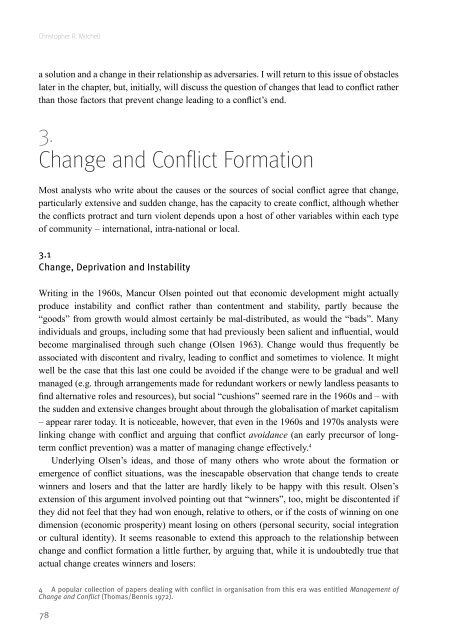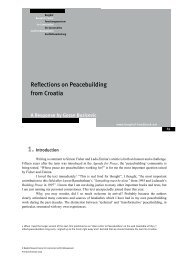Conflict, Change and Conflict Resolution - Berghof Handbook for ...
Conflict, Change and Conflict Resolution - Berghof Handbook for ...
Conflict, Change and Conflict Resolution - Berghof Handbook for ...
You also want an ePaper? Increase the reach of your titles
YUMPU automatically turns print PDFs into web optimized ePapers that Google loves.
Christopher R. Mitchell<br />
a solution <strong>and</strong> a change in their relationship as adversaries. I will return to this issue of obstacles<br />
later in the chapter, but, initially, will discuss the question of changes that lead to conflict rather<br />
than those factors that prevent change leading to a conflict’s end.<br />
3.<br />
<strong>Change</strong> <strong>and</strong> <strong>Conflict</strong> Formation<br />
Most analysts who write about the causes or the sources of social conflict agree that change,<br />
particularly extensive <strong>and</strong> sudden change, has the capacity to create conflict, although whether<br />
the conflicts protract <strong>and</strong> turn violent depends upon a host of other variables within each type<br />
of community – international, intra-national or local.<br />
3.1<br />
<strong>Change</strong>, Deprivation <strong>and</strong> Instability<br />
Writing in the 1960s, Mancur Olsen pointed out that economic development might actually<br />
produce instability <strong>and</strong> conflict rather than contentment <strong>and</strong> stability, partly because the<br />
“goods” from growth would almost certainly be mal-distributed, as would the “bads”. Many<br />
individuals <strong>and</strong> groups, including some that had previously been salient <strong>and</strong> influential, would<br />
become marginalised through such change (Olsen 1963). <strong>Change</strong> would thus frequently be<br />
associated with discontent <strong>and</strong> rivalry, leading to conflict <strong>and</strong> sometimes to violence. It might<br />
well be the case that this last one could be avoided if the change were to be gradual <strong>and</strong> well<br />
managed (e.g. through arrangements made <strong>for</strong> redundant workers or newly l<strong>and</strong>less peasants to<br />
find alternative roles <strong>and</strong> resources), but social “cushions” seemed rare in the 1960s <strong>and</strong> – with<br />
the sudden <strong>and</strong> extensive changes brought about through the globalisation of market capitalism<br />
– appear rarer today. It is noticeable, however, that even in the 1960s <strong>and</strong> 1970s analysts were<br />
linking change with conflict <strong>and</strong> arguing that conflict avoidance (an early precursor of longterm<br />
conflict prevention) was a matter of managing change effectively. 4<br />
Underlying Olsen’s ideas, <strong>and</strong> those of many others who wrote about the <strong>for</strong>mation or<br />
emergence of conflict situations, was the inescapable observation that change tends to create<br />
winners <strong>and</strong> losers <strong>and</strong> that the latter are hardly likely to be happy with this result. Olsen’s<br />
extension of this argument involved pointing out that “winners”, too, might be discontented if<br />
they did not feel that they had won enough, relative to others, or if the costs of winning on one<br />
dimension (economic prosperity) meant losing on others (personal security, social integration<br />
or cultural identity). It seems reasonable to extend this approach to the relationship between<br />
change <strong>and</strong> conflict <strong>for</strong>mation a little further, by arguing that, while it is undoubtedly true that<br />
actual change creates winners <strong>and</strong> losers:<br />
4 A popular collection of papers dealing with conflict in organisation from this era was entitled Management of<br />
<strong>Change</strong> <strong>and</strong> <strong>Conflict</strong> (Thomas/Bennis 1972).<br />
78
















